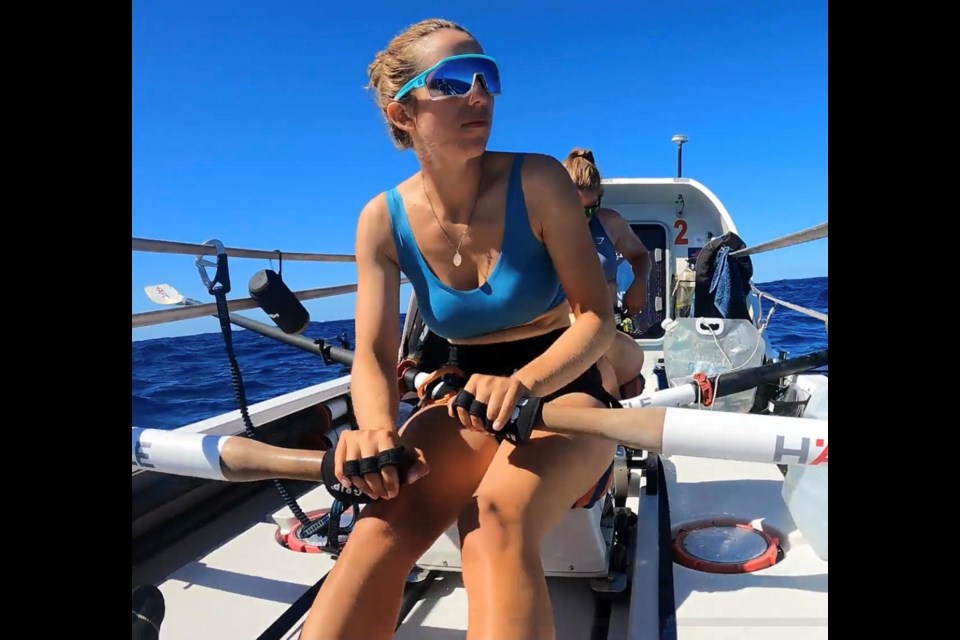Four thousand eight hundred kilometres—that's how far Vancouver resident Jessica Mullins and three other crew members rowed across the open ocean this past December. As competitors in the Talisker Whisky Atlantic Challenge, Mullins and team spent 42 days, four hours, and 54 minutes crossing the Atlantic westward from La Gomera, Spain, to Antigua in the Caribbean.
A distance of 4,800 km on its own can be hard to fathom. Imagine leaving Vancouver and travelling in a straight line all the way to the country's northernmost point at Cape Columbia, Nunavut. You would find yourself deep in the Arctic Circle, yet you'd still be about 700 km short of matching how far the team rowed. Couple that distance with constant sun exposure, high surf, and sea life for an experience unlike anything Mullins has ever done before.
"It was horrendously amazing—one of the wildest things I've ever done," she says.
When Mullins first decided she wanted to undertake the crossing three years ago she only had novice rowing experience but plenty of determination. Through a recruiting campaign, she found three other people, all from the UK, to row with her and the team began to train from afar due to COVID-19 travel restrictions. In fact, the group didn't meet in person until March 2021, only seven months before their planned departure date.
Zoom meetings, individual training, and group conditioning helped the team prepare for the race. Sponsorships and their own money funded the adventure which started in earnest on December 12, 2021. Within two days, the boat was out of sight of land. It would remain that way for many weeks to come.
'Predominantly it's a mental health challenge'
In order to make it to Antigua, the team rowed in shifts of two hours interspersed with two hours of rest. They stopped roughly every four days to clean the boat—otherwise, they were constantly rowing.
"Of course, it's physically challenging," Mullins says. "The weather is baking, you're sleep deprived, hungry and have hallucinations, but predominantly it's a mental health challenge."
Part of that challenge comes with spending every waking moment in close proximity with the same three people for over a month in a high-risk environment. But there's also the element of fear. As the skipper, Mullins was determined to keep her eye on the prize and not express any misgivings during the crossing, lest her team start feeling fearful too. Now back on land, she openly admits to being scared at times.
"You're right at the water level when you're in the boat so you're very exposed," she explains. "In the middle of the night when there's no moonlight at all and there's massive waves crashing on you ... if you're not clipped onto the boat and you fall out you can't be rescued."
Nonetheless, the team landed in Antigua in one piece albeit significantly skinnier. Mullins lost 10 kilos despite consuming 5,000 calories every day. And while she was done with the rowing she wasn't over the Atlantic quite yet—she decided to help one of the race organizers sail a support boat back to Spain.
What's next for the rower?
"I'm mad. I think I lost my marbles," she says about crossing the ocean a second time. Mullins returned to Vancouver in early June 2022 where she has lived for the past five years and works as an occupational therapist. As for her future on the high seas, Mullins says she wants to row the Pacific from San Francisco to Hawai'i but doesn't have any concrete plans yet. She also belongs to the False Creek Rowing Club.
As part of the race, the team raised money for a number of charities, including Vancouver's Covenant House, which provides resources and shelter for youth in need. Mullins hopes her journey will inspire others to pursue their dreams, no matter how unattainable they might seem.
"So many people thought my dream was unrealistic, especially as a woman," she says. "The more I heard that, the more I was motivated to do it. You can achieve whatever it is you want to do!"




